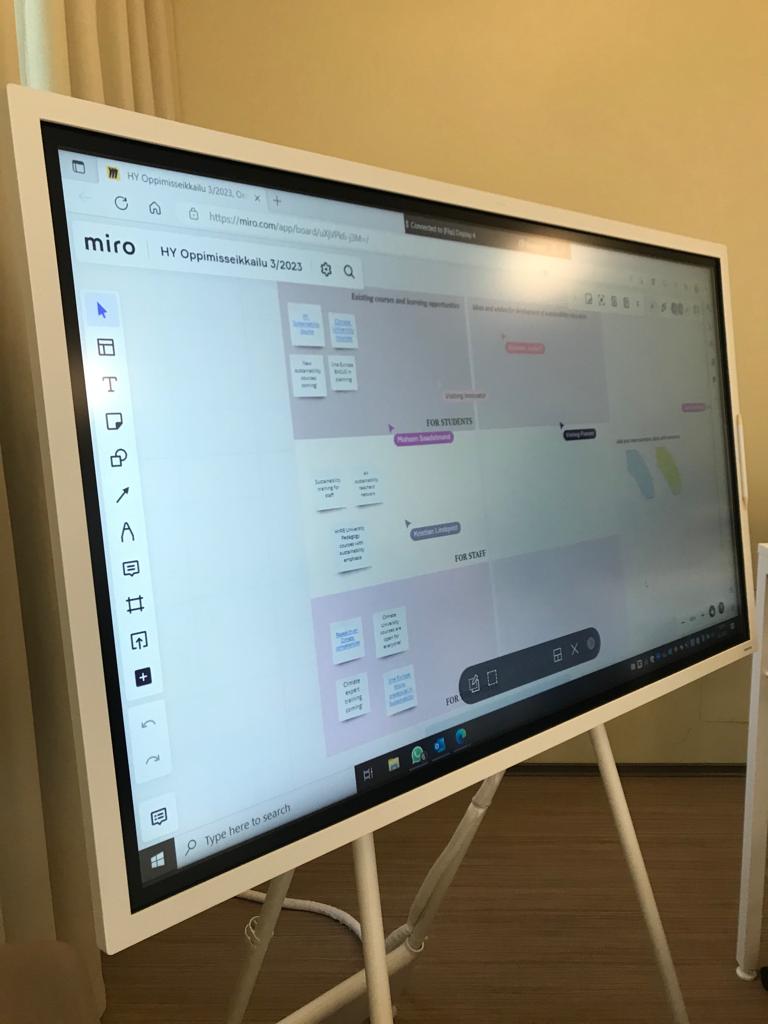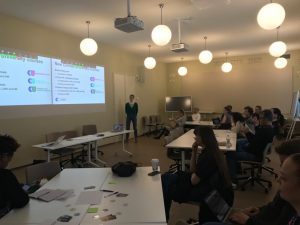This blog post is a continuation of the first blog post discussing a workshop called “Una Europa: Designing the Education of the Future?” organised by the University of Helsinki on 8 March. You can read the first part here.
Sustainability as the Starting Point for All University Studies
When we discussed the second topic, addressing sustainability in international educational cooperation, it quickly turned out that these two comprise quite a tricky combination. Firstly, sustainability – including both environmental, social and economic sustainability – should be the starting point for all international educational cooperation. In other words, it should not be a side note that is discussed every now and then. Instead, all activities in international cooperation should be considered through a sustainability lens, which means that their effects are evaluated in respect to all the different aspects of sustainable development. As all university activities, addressing sustainability must be research-based. Additionally, sustainability should not only be the core theme in subject fields directly addressing it but also an integral part of all other disciplines. Inter- and multidisciplinarity increase our understanding of the different aspects of sustainable development and the complex interactions between them.
Secondly, international educational cooperation must always aim for mutual understanding, creating safer spaces and taking action. When addressing sustainability in international cooperation, involving marginalised actors and those who suffer the most from unsustainable actions, such as people and organisations from the Global South, is essential. Since the effects of unsustainability are the fastest and strongest in their lives, their thoughts and experiences must be heard in the first place. As in all areas of international educational cooperation, sharing good practices and generating them together is the key in promoting sustainability. Instead of blaming others and criticising their unsustainable actions, we must help each other to make improvements. Healthy competition and ambitious standards accelerate the change, but no one must be left behind.
Lastly, mobility is an integral part of international educational cooperation, but at the same time, moving physically long distances is a major emission source. Hence, promoting green mobility is at the core of international cooperation. This means, for example, improving greener transportation options as well as digital mobility opportunities. Meanwhile, we must ensure that there are suitable mobility opportunities for everyone regardless of students’ and teachers’ wealth, abilities, place of residence, situation in life and other factors.

Students Designing the Education of the Future
When it comes to the third topic, creating standards for student involvement in international educational cooperation, we focused on promoting student agency in sustainability related learning. Firstly, students should be better informed about different sustainability related opportunities because at present, many students do not even know that this kind of opportunities exist.
Secondly, students must be truly encouraged to engage in sustainability related activities. Currently, participating in them is extra work for students, which means that only students who are passionate about sustainability and have time and other resources to get involved find their way to these activities. Unfortunately, this workshop was not an exception to the rule as students were underrepresented. Thus, we need to think about how we can integrate the promotion of sustainability into university studies in a way that makes engaging with sustainability issues natural for all students. For instance, a sustainability lens should also be adopted in compulsory courses and each subject field. Sustainability competencies must be an integral part of every student’s studies in the same way as, for example, language skills or digital skills currently are.
Naturally, most of the sustainability related international courses are currently taught online. While it is undoubtedly the most meaningful way to implement such collaboration, we must not forget the accessibility of these courses. They must also be accessible in places where the Internet infrastructure is poor as well as for students with different disabilities. Furthermore, there should also be in-person options for students who are not able to participate online for some reason or another. Most importantly, students must always be involved in the planning and implementing processes of both current and new projects, courses, degree programmes as well as teaching and learning methods. Active participation begins with motivation, so students must feel that their involvement in developing higher education really makes a difference. It is students, however, who will change the world in the future with the competencies they gain at today’s and tomorrow’s universities.
To Infinity and Beyond
So, it can be concluded that this workshop provoked quite a few thoughts in me! Woah, it seems that these two blog posts almost grew into a kind of manifesto. 😄 I must admit that our discussions in the workshop were perhaps quite high-flown and not every university student will make world-shaking contributions in their professional career. But hey, if we were not ambitious, how could we ever make sustainable changes that really matter?
If this blog post provoked some thoughts or feelings in you, please share them in the comments! We would love to hear from you!
Written by Maisa Mikkola
Photo by Stinne Vognæs


